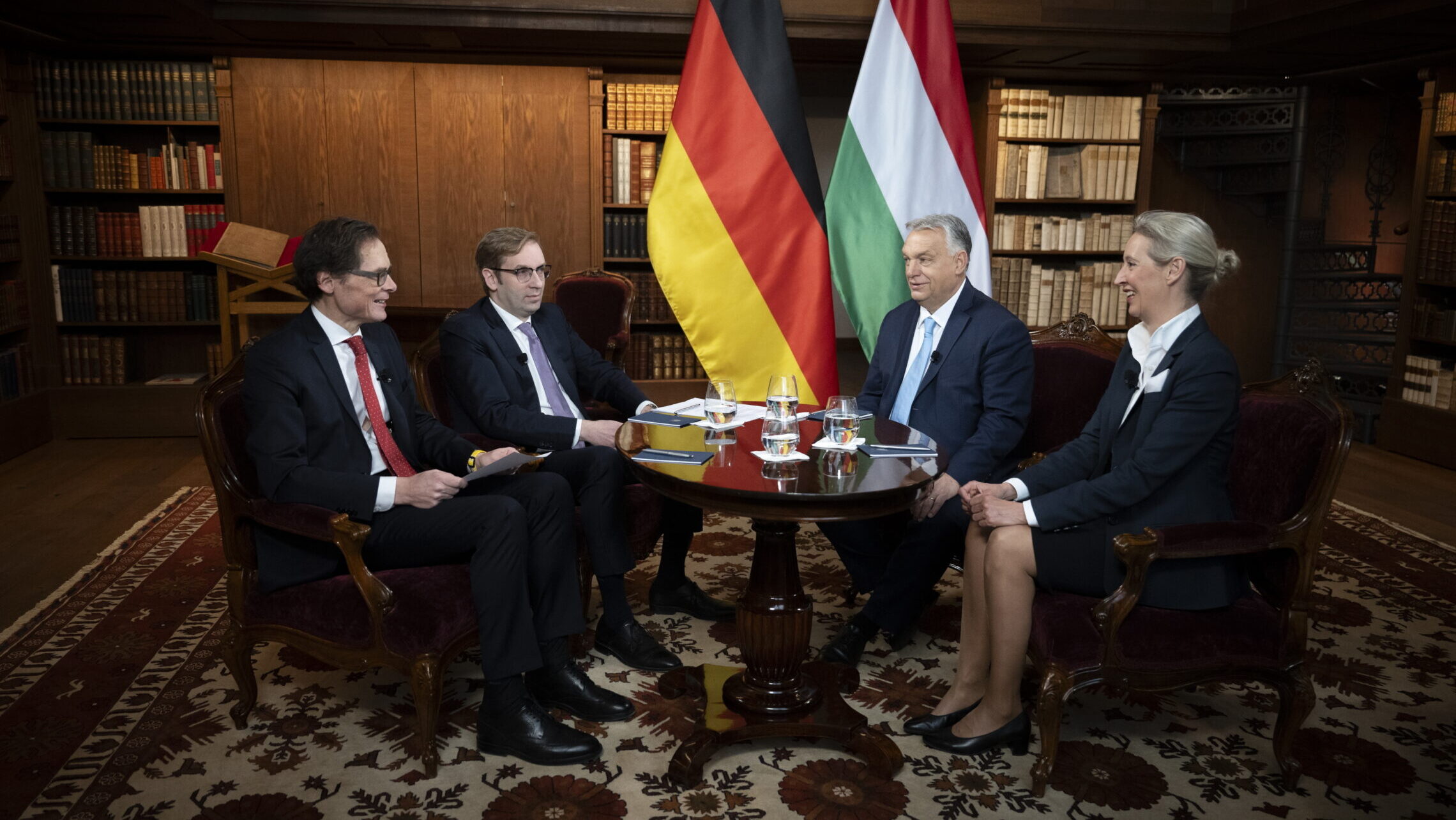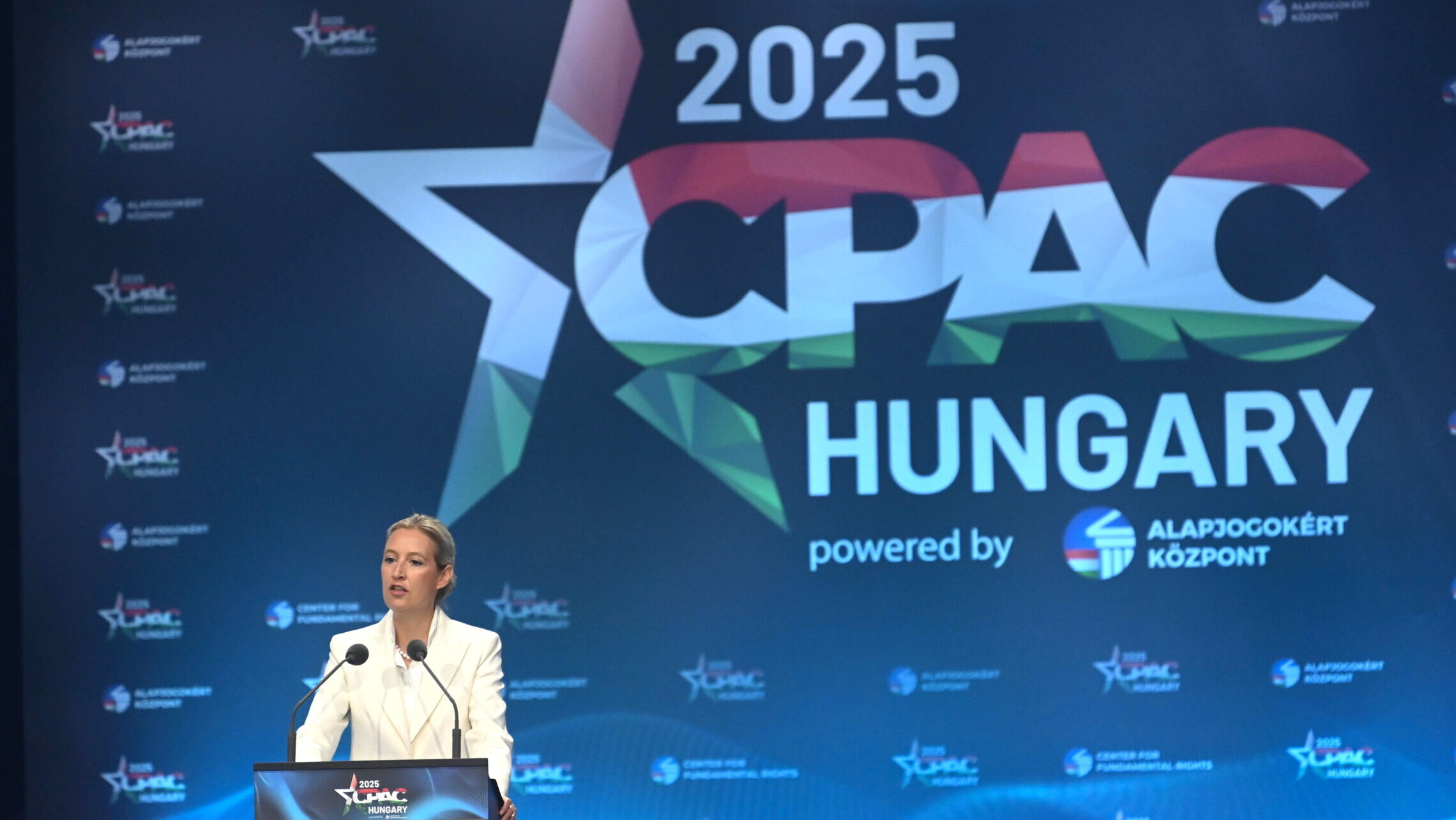The https://english.atlatszo.hu use cookies to track and profile customers such as action tags and pixel tracking on our website to assist our marketing. On our website we use technical, analytical, marketing and preference cookies. These are necessary for our site to work properly and to give us inforamation about how our site is used. See Cookies Policy
Fidesz seeks to influence German domestic politics by embracing the AfD
While the Orbán government celebrates national sovereignty and denounces foreign meddling, they are working hard to influence German domestic politics. They see the vehicle for this in elevating the far-right Alternative für Deutschland (AfD).
“Berlin has always been the city of walls – now it’s time to tear down another one” Viktor Orbán said in February 2025, announcing his meeting with AfD co-leader Alice Weidel, only twelve days before the German parliamentary elections. That move was something Orbán in the past called unacceptable. He said that meeting the opposition leader would “sacrifice interstate relations.”

Mentioning a wall, Orbán referred to the firewall erected around the AfD: cooperation with them was deemed unacceptable by Germany’s mainstream parties, and this was understood across Europe. Nevertheless, the Hungarian government made the Orbán–Weidel meeting happen – a decision likely aided by the fact that by then, the US president was already Donald Trump, and on social media Elon Musk had recently written that only the AfD could save Germany.
Familiar communication tricks
According to German Marshall Fund analyst Végh Zsuzsanna, signals from the U.S. administration may indeed confer a legitimacy boost to the Hungarian government – but that is not the only reason behind their support for the AfD. She points out that the AfD has been gaining support in Germany, becoming one of the major players on the European radical right.
Végh added that Orbán is aware that if the AfD gains strength, it could shift the center-right CDU/CSU bloc closer to his own ideological direction – a move that the Hungarian government may influence indirectly or directly by supporting the AfD.
But Fidesz’s help to the German far right goes further than high-profile meetings.
Behind the scenes, a process began some time ago.
This summer, an internal strategy paper was released from an AfD parliamentary group session in which the party declared that it aims to come to power by stoking a culture war.
The AfD plans to do this by stirring up the far left, bringing issues such as migration, gender, or socialism to the forefront constantly. In doing so, they hope to push the governing SPD and the Greens further left, putting pressure on the CDU/CSU – such that the only remaining alternative for voters could become the AfD itself.
This is a familiar strategy for Hungarians too – the way Fidesz positioned itself as the conservative option, pushing everything else under the label of “left-wing”. Various circumstances indicate that the AfD may have picked up some of these methods directly from Fidesz circles.

Viktor Orbán welcomes Alice Weidel, co-chair of the Alternative for Germany (AfD) party (r), at the Carmelite Monastery on February 12, 2025. Next to them are Zoltán Szalai, director general of Mathias Corvinus Collegium (MCC) and editor-in-chief of Mandiner (l2), and Roger Köppel, editor-in-chief of Weltwoche (l). (photo: MTI/Prime Minister’s Press Office/Benko Vivien Cher)
Legitimising the AfD through visibility
The Hungarian-linked network behind this is the self-proclaimed campaign platform “The Republic,” set up to prevent any leftward drift in Germany. Although headed by former CSU member Armin Petschner-Multari, its leadership also includes people formerly close to the CDU/CSU parliamentary group, such as Arian Aghashahi, a former aide of CDU/CSU group leader Jens Spahn.
The Republic recently organized an event in Berlin – modelled closely on the US-style CPAC – which was invitation-only or required a relatively high entry fee, and independent media were excluded. Prominent right-wing politicians from the US and Europe were invited to this event, including representatives from the CDU party foundation, the Konrad Adenauer Stiftung.

Alice Weidel, co-chair of the Alternative for Germany (AfD) party, delivers a speech on the second day of the two-day CPAC (Conservative Political Action Conference) Hungary at the Budapest Congress Center on May 30, 2025. (photo: MTI/Noémi Bruzák)
These steps are not a coincidence: the goal is to bring together the trans-Atlantic right – including groups tied to the “MAGA” movement around Trump – and attempt to draw in parts of the CDU/CSU bloc.
Hungarian government-affiliated organizations also contributed to the effort.
In addition, The Republic regularly cooperates with the Saarland-based Union Foundation – linked to the local CDU – and at its recent events appeared speakers such as Bauer Bence (director of the MCC German-Hungarian Institute) and political scientist Werner Patzelt (research director at the MCC’s Brussels center).
Bauer Bence often argues – in articles and speeches – that the CDU should work with the AfD. That is exactly what happened at this summer’s MCC Festival, where he held a conversation with CDU politician Saskia Ludwig – while AfD co-leader Alice Weidel sat in the front row. After the discussion, Ludwig spoke amiably with Weidel, provoking a large scandal in Germany.

Saskia Ludwig (l2) speaks at MCC Fest on August 15, 2025, next to her (r2) Bence Bauer (photo: MCC/Facebook)
Hungarian government-linked media and networks are working to normalize and elevate the AfD.
That explains why Weidel visited Hungary three times this year
– and why she, rather than her co-leader Tino Chrupalla, has been presented as the “face” of the party.
At the top political level, the Hungarian government is backing the AfD by personally receiving Weidel, giving her a platform in pro-government publications, offering stages at MCC events, and promoting the narrative that she is Germany’s savior – portraying the AfD as unfairly persecuted.
Hedging bets
Currently, Fidesz is playing both sides. On one hand, for the sake of interstate relations, it tries to maintain contacts with CDU/CSU politicians; on the other hand, it follows and seeks out individuals open to rapprochement with the AfD – such as Saskia Ludwig.
According to Végh Zsuzsanna, Fidesz’s goal is to help normalize the AfD – with the hope that, over time, the differences between the AfD and the traditional CDU/CSU on certain policy areas will shrink.
Hungarian government-friendly circles, then, are betting on a long-term process: by eroding the firewall around the AfD, even if only gradually and starting at regional levels in Germany, they hope eventually to shift German politics in a direction more aligned with their worldview.
Written by Milán Dóka, translated by Zalán Zubor. The original Hungarian version can be found here. Cover image: Prime Minister Viktor Orbán, President of Fidesz, and Alice Weidel, Co-Chair of Alternative for Germany (AfD), shake hands after their talks at a press conference held at the Carmelite Monastery on February 12, 2025. (photo: MTI/Szilárd Koszticsák)
Share:
Your support matters. Your donation helps us to uncover the truth.
- PayPal
- Bank transfer
- Patreon
- Benevity
Support our work with a PayPal donation to the Átlátszónet Foundation! Thank you.
Support our work by bank transfer to the account of the Átlátszónet Foundation. Please add in the comments: “Donation”
Beneficiary: Átlátszónet Alapítvány, bank name and address: Raiffeisen Bank, H-1054 Budapest, Akadémia utca 6.
EUR: IBAN HU36 1201 1265 0142 5189 0040 0002
USD: IBAN HU36 1201 1265 0142 5189 0050 0009
HUF: IBAN HU78 1201 1265 0142 5189 0030 0005
SWIFT: UBRTHUHB
Be a follower on Patreon
Support us on Benevity!

